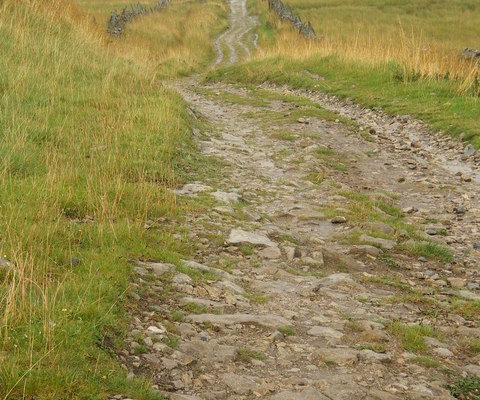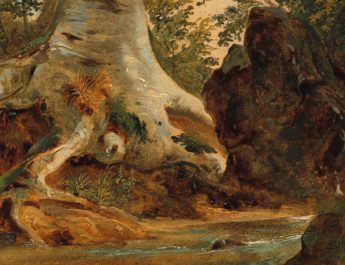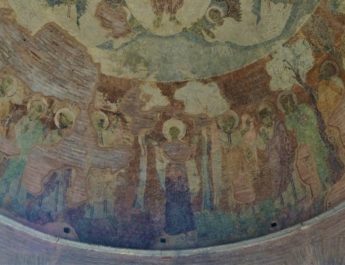Isaiah 62:6-12
Christmas Dawn ABC
6 Upon your walls,A O Jerusalem,B
I have posted sentinels;C
all day and all night
they shall never be silent.D
You who remindE the Lord,F
take no rest,G
7 and give him no restH
until he establishes Jerusalem
and makes it renownedI throughout the earth.
A “walls” = chomah. From the same as cham (father-in-law; specifically, husband’s father). The root may mean to join so this is a wall for the purpose of protection.
B “Jerusalem” = yerushalayim. From yarah (to throw, shoot, be stunned; to flow as water so figuratively to instruct or teach) + shalem (to make amends, to be complete or sound). This is Jerusalem, dwelling of peace.
C “sentinels” = shamar. This is to keep, watch, guard, protect, or preserve. Properly, it means creating a hedge around something. This is the participle form of the verb – so this is “one who watches” i.e. “keeper.” This is the same as “am I my brother’s keeper?” (Gen 4:9) and repeated commands to keep the covenant, keep the commandments, etc.
D “be silent” = chashah. 15x in OT – 7x of human silence, 5x of God’s silence, 2x of human inaction, and 1x of nature stilled. Can be a literal silence as hushing or being quiet or it can mean being still or inactive.
E “remind” = zakar. Literally, this is to mark something so that it can be recognized. It can mean remember or be mindful. Remembering can also imply mentioning or retelling. Specially, this word can mean to burn incense, which can be a metaphor for prayer.
F “Lord” = YHVH. From havah (to be, become) or hayah (to come to pass, become, be). This is the name of the God of Israel, the self-existent and eternal one, the tetragrammaton. This pronunciation has been lost to time so “Lord” is generally used in its place.
G “take…rest” = domi. 4x in OT. From damah (to cease, cut off, ruin, destroy, silence, be undone; to be mute or silent and so to fail or perish; destruction as bringing to silence). This word is cessation, a pause, a cutting off, middle, quiet, or rest.
H “rest” = domi. Same as “take…rest” in v6.
I “renowned” = tehillah. From halah (to be boastful, to praise). This is praise or song of praise. It describes a song that is joyful, boasting in God, a hymn. It can also describe a deep place.
8 The Lord has swornJ by his right handK
and by his mightyL arm:M
I will not again give your grain
to be food for your enemies,
and foreignersN shall not drink the wineO
for which you have labored;P
9 but those who garner it shall eat it
and praiseQ the Lord,
and those who gather it shall drink it
in my holyR courts.
J “sworn” = sheba. From sheba (seven, by sevenfold; it can also be used to imply a week or an indefinite number; symbolically, this is the number of fullness, sacredness, perfection). This verb, properly means to be complete – literally, to seven yourself. In terms of oath taking, this is to swear with the same seriousness as if you had declared the thing seven times.
K “right hand” = yamin. May be from yamam (to go or choose the right, use the right hand; to be physically fit or firm). This can mean right hand, right side, or south. Since most people are right-handed, the metaphorical usage of this word presumes that the right hand is stronger and more agile. Thus, it is the instrument of power and action.
L “mighty” = oz. From azaz (to be strong, become fixed, be bold, prevail, be impudent; it means to be stout literally or figuratively. A Late Hebrew word). This is strength in the sense of force, majesty, praise, material and physical strength, the abstract notion of security. It can also speak of social or political power.
M “arm” = zeroa. May be from zara (to sow, scatter seed, conceive). This is arm, shoulder, or foreleg of animals. Figuratively used for strength, force, help, or power.
N “foreigners” = ben + nekar. Literally “children of foreigners.” Nekar comes from the same as neker (misfortune, calamity, disaster). This is something that is foreign or strange, foreignness.
O “wine” = tirosh. From yarash (to take possession of, drive out; to occupy a place through expelling the previous inhabitants and taking their place; it implies seizing, robbing, or (more benignly) inheriting in general; because of the sinister meanings, this word can also mean impoverish, ruin, or seize upon). This is new wine or sweet wine. Since it is new wine, it is juice that has just been squeezed from the grape.
P “labored” = yaga. This is work in the sense of toiling, growing weary or worn, fainting. Properly, it means to gasp and so it means working to the point of exhaustion.
Q “praise” = halal. Related to “renowned” in v7. This is to be clear – it originally referred to a sound, then a color. It was to shine and then make a show or boast then to rave. In a causative sense it came to mean celebrate, give glory, sing praise, or be worth of praise. Because of the celebratory nature of the word, it could also mean to give in marriage. This is where Hallelujah comes from.
R “holy” = qodesh. This is set apart and so sacred. God is different from us and so God is holy/set apart. Things we dedicate to God’s service are set apart for God and so they, too, are holy, etc.
10 Go through, go through the gates,
prepareS the wayT for the people;
build up,U build up the highway,V
clearW it of stones,
lift up an ensignX over the peoples.
11 YThe Lord has proclaimedZ
to the end of the earth:
Say to daughter Zion,AA
“See,BB your salvationCC comes;
DDhis rewardEE is with him,
and his recompenseFF before him.”GG
12 They shall be called, “The Holy People,
The RedeemedHH of the Lord”;
and you shall be called, “Sought Out,II
A CityJJ Not Forsaken.”KK
S “prepare” = panah. This is to turn, appear, behold, come one, prepare, regard, mark, have respect to. In the sense of to turn, it implies to face something i.e. to look. This is where the Hebrew word for face comes from “paneh.”
T “way” = derek. From darak (to tread, march, to walk. Can also mean affixing a string to a box since one needs to step on it to bend it in the process; so also an archer). This is a road as a thing that is walked on. Can be used figuratively for the path that one’s life takes or how one chooses to live one’s life.
U “build up” = salal. 12x in OT. This is to lift up, build, make plain. It is to mount up, such as one does to make a turnpike. Figuratively, it means to exalt. Reflexively, it can mean resistance as a dam against water.
V “highway” = mesillah. Related to “build up” in v10. From salal (see note U). This is a highway that is turnpiked. Can be used for a course, path, staircase, or viaduct.
W “clear” = saqal. Properly, this word means to be weighty. Most often, it is used of stoning someone (to death) or casting stones in generally. But, it can also mean clearing stones away. It is not used in Ecclesiastes 3:5 (“a time to cast away stones…”).
X “ensign” = nes. From nasas (may mean to be high or in plain sight, displayed, sparkling; this is something that gleams from afar, which implied something very noticeable like a banner or signal; can mean to raise a beacon). This is a flag, sail, standard, signal, sign, banner, warning pole, or some kind of distinguishing mark.
Y (untranslated) = hinneh. From hen (lo! Behold! If, though; an expression of surprise). This is to draw attention, show suddenness or surprise, or to emphasize the importance of the coming statement. See! Lo! Behold!
Z “proclaimed” = shama. This is to hear, call, consent, or consider. It implies listening intelligently, giving attention, and, because of these two factors, obedience and action are often implied. In this passage, the word is in the Hiphil tense (which means to take the normal meaning of the word and add “to cause to ________.”). Hence, proclaim (i.e. “cause to hear/attend/act.”)
AA “Zion” = tsiyyon. The word is related to tsyiyyun (signpost, monument); from tsavah (to charge someone, to command, order); from the same as tsiyyah (dryness drought); from a root meaning parched as desert, dry land. Zion can refer to a mountain in Jerusalem as well as another name for Jerusalem itself or the people.
BB “see” = hinneh. Same as untranslated word in v11. (see note Y).
CC “salvation” = yesha. From yasha (to deliver, defend, help, preserve, rescue, be safe. Properly, to be open, wide or free, which implies being safe. Used causatively, it means to free). This is salvation, deliverance, rescue, safety, welfare, liberty.
DD (untranslated) = hinneh. Same as untranslated word and “see” in v11. (see note Y).
EE “reward” = sakar. From sakar (to hire, earn, reward). This is wages, compensation, or service. It is a contact paid out, a salary. It implies compensation or, more generally, benefit.
FF “recompense” = peullah. 14x in NT. From paal (to do, make, accomplish, perform, work or worker; this is doing or making something on a regular basis and in an organized way; it can especially mean to practice). This is work, recompense, deed, labor, reward, or wages.
GG “before him” = paneh. Literally “before his face.” Related to “prepare” in v10.
HH “redeemed” = gaal. This is to redeem someone or something according to kinship laws. So, it could be acting on a relative’s behalf to buy back their property, to marry one’s brother’s widow, etc. This could be more briefly translated as to redeem, acts as kinsman, or purchase. As a noun, it could be deliverer or avenger.
II “sought out” = darash. To seek, ask, inquire, or care for. Properly, this means to walk or frequent – often in the sense of pursuing someone or something or searching. Thus, it has the sense of inquiring. In the sense of seeking, it can mean “to worship.” This is where the Jewish concept of midrash comes from – their word for interpreting, studying, and asking theological questions.
JJ “city” = iyr. From uwr (to awaken or wake oneself up). This can mean excitement in the sense of wakefulness or city. Properly, this is a place that is guarded. Guards kept schedules according to watches. This sense of the word would include cities as well as encampments or posts that were guarded.
KK “forsaken” = azab. This is leave, abandon, forsake, leave destitute, or fail.
“Cam High Road – Roman Road to Bainbridge” by Tom Howard is licensed under CC BY-SA 2.0




